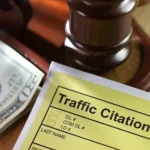Getting a speeding ticket can be an unwelcome surprise for anyone who enjoys the thrill of the open road. Suddenly, you find yourself caught in the web of traffic laws, facing the prospect of fines, points on your license, and the inconvenience of a court appearance. But fear not, fellow road warriors! In this article, we’ll delve into the world of speeding tickets, exploring what they are, why you might get one, and what to expect when you have to face the courthouse music. Buckle up for a ride through the nuances of traffic violations and the road to resolving them.
What Is a Speeding Ticket?
A speeding ticket is an official citation issued by law enforcement to a motorist who has exceeded the designated speed limit on a particular roadway. The primary purpose of these tickets is to enforce traffic regulations, enhance road safety, and discourage drivers from driving at unsafe speeds that could contribute to accidents or other hazards. It typically contains detailed information about the violation, including the specific speed at which you were traveling, the posted speed limit for the area, and the location and time of the infraction. The details on the ticket serve as documentation of the offense and are essential for legal proceedings.
Speeding tickets are a key component of traffic law enforcement, aiming to maintain road order and protect public safety. In addition to the financial consequences of fines, receiving a speeding ticket often accumulates demerit points on your driving record. The number of points assigned usually corresponds to the severity of the violation. Accruing too many points within a specific timeframe can lead to repercussions, such as increased car insurance premiums, mandatory attendance at traffic school, or even the suspension of your driver’s license. Drivers must be aware of the speed limits in different areas, adhere to them, and understand the potential consequences of failing to do so.
Navigating the aftermath of a speeding ticket may involve contesting the citation in traffic court, paying the fine promptly, or exploring options for mitigating the impact on your driving record. In essence, a comprehensive understanding of speeding tickets goes beyond acknowledging a violation; it encompasses the broader context of traffic regulations, safety considerations, and the legal implications for motorists.
Situations That Warrant a Speed Ticket
Speeding tickets can be issued when drivers fail to comply with established speed limits. Understanding the diverse scenarios in which you might receive a speeding ticket is crucial for promoting road safety and avoiding legal consequences. Here’s a more comprehensive overview:
1. Exceeding Posted Speed Limits:
The most common scenario is straightforward – driving at a speed higher than the posted limit on a given roadway. Speed limits are established based on road design, traffic patterns, and safety considerations. Violating these limits can result in a citation, with fines escalating depending on the severity of the offense.
2. Speeding in School Zones or Construction Areas:
Special speed limits are often designated in areas with heightened safety concerns, such as school zones and construction areas. These lower speed limits aim to protect pedestrians, children, and construction workers. Speeding within these zones is not only a violation of traffic laws but also poses an increased risk of accidents.
3. Reckless Driving:

Some jurisdictions consider driving excessively high speed, regardless of the posted limit, reckless driving. This can encompass situations where a driver’s speed endangers the safety of others on the road. Reckless driving charges often result in more severe penalties than a standard speeding ticket.
4. Speeding in Residential Areas:
Residential neighborhoods frequently have lower speed limits to prioritize the safety of residents. Driving above these limits risks a speeding ticket and can lead to increased community concerns about road safety.
5. Speeding in Adverse Weather Conditions:
Adverse weather conditions like rain, snow, or fog can significantly impact road safety. Some jurisdictions may impose reduced speed limits during inclement weather to account for decreased visibility and slippery road surfaces. Ignoring these adjusted limits can result in a speeding ticket.
6. Speed Traps and Radar Enforcement:
Law enforcement often employs speed traps or radar devices to catch drivers exceeding speed limits. Speed traps involve strategically positioning officers to monitor and apprehend speeders while radar devices detect and record speeds. These enforcement measures aim to deter speeding and enhance overall road safety.
7. Automated Speed Cameras:

In certain locations, automated speed cameras detect and capture images of vehicles exceeding speed limits. These cameras operate without direct police intervention and may be placed in areas prone to speeding. Violations recorded by these devices lead to the issuance of speeding tickets, often accompanied by photographic evidence.
Understanding the diverse situations in which speeding tickets can be issued is essential for drivers to make informed decisions on the road. Adhering to posted speed limits, adjusting speed based on road conditions, and staying vigilant for regulatory changes can help minimize the risk of receiving a speeding ticket and the associated consequences, such as fines, points on the driving record, and potential increases in insurance premiums.
Challenging a Speed Ticket in Court
Challenging a speeding ticket in court can be a complex but worthwhile process for drivers who believe they have been unjustly cited. It involves a series of strategic steps and legal considerations. Here’s an in-depth guide on how to challenge a speeding ticket, exploring various aspects and legal options:
1. Careful Review of the Ticket:
Start by meticulously examining the details of the speeding ticket. Look for inaccuracies such as the date, time, location, or vehicle details. Any errors could serve as grounds for dismissal.
2. Understanding the Violation:
Gain a thorough understanding of the specific violation cited on the ticket. Different jurisdictions may have variations in how speeding offenses are classified, so knowing the nature of the alleged violation is crucial for building an effective defense strategy.
3. Gathering Evidence:
Collecting compelling evidence is key to challenging a speeding ticket. This may include photographs, witness statements, or any documentation that challenges the accuracy of the ticket. For instance, if the speed measurement was based on radar or laser technology, inquire about the calibration records.
4. Consulting with an Attorney:
Seeking legal advice from an attorney with expertise in traffic law can provide valuable insights. An experienced attorney can assess the strength of your case, advise on potential defenses, and guide you through courtroom procedures.
5. Pleading Not Guilty:
To officially contest a speeding ticket, you must plead not guilty. This initiates challenging the citation and may result in a scheduled court date.
6. Pre-Trial Hearing:
Attend a pre-trial hearing, where you can negotiate with the prosecutor or present your case before a judge. Some jurisdictions offer diversion programs or reduced penalties for first-time offenders during this stage.
7. Trial Proceedings:

The case proceeds to trial if an agreement cannot be reached during the pre-trial hearing. Prepare to present your evidence, question witnesses, and articulate your defense. Be ready to argue legal points, such as the accuracy of speed measurement devices, the officer’s training, or the circumstances surrounding the alleged violation.
8. Challenging the Evidence:
Actively contest the evidence presented by the prosecution. This may involve questioning the reliability of speed detection devices, challenging the officer’s observations, or scrutinizing witness statements.
9. Exploring Legal Defenses:
Explore potential legal defenses applicable to your situation. These may include necessity (e.g., speeding to avoid an accident), mistaken identity, or arguments related to faulty equipment. Different jurisdictions recognize various defenses, so understanding local laws is crucial.
10. Appeal Considerations:
If the verdict is unfavorable, assess whether there are grounds for an appeal. Consult with your attorney to determine an appeal’s feasibility and potential success, keeping in mind the specific procedures and timelines involved.
Challenging a speeding ticket demands careful preparation, knowledge of traffic laws, and sometimes legal representation. While success is not guaranteed, understanding the available options empowers drivers to make informed decisions and seek a fair resolution in the face of a speeding citation. Remember that laws and procedures may vary by jurisdiction, so it’s essential to tailor your approach accordingly.
Oluwatukesi Joseph is a Content Writer at LOBF. He holds a Master’s Degree from Obafemi Awolowo University in Architecture, However, his love for writing and content creation has transitioned him into the writing and content marketing field. He has gained relevant certification from other notable Universities where he developed a strong foundation in content marketing and writing.
Outside of work, Joseph enjoys spending quality time with friends and family and playing chess, which he finds often complements his professional pursuits. Joseph is excited to be part of the dynamic team at The Law Office of Bryan Fagan, contributing his expertise to spreading the good news of LOBF to Families across Texas.




